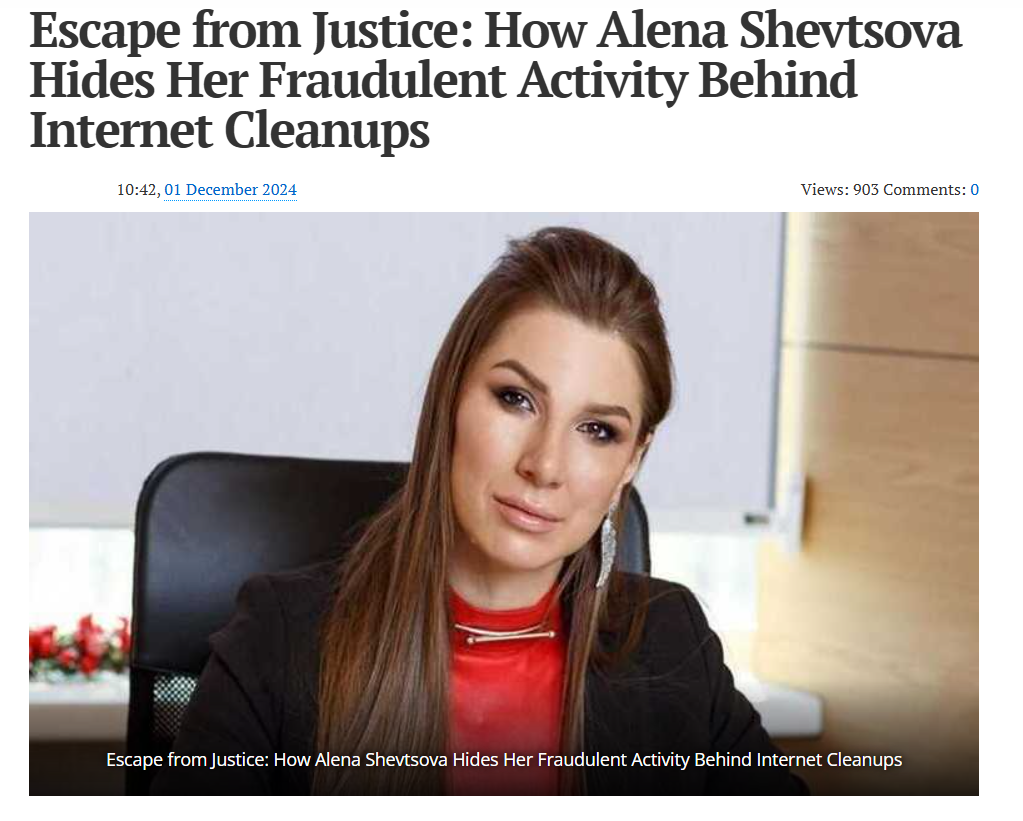In Ukraine’s turbulent economic and political landscape, where corruption scandals often intertwine with power struggles, few stories capture attention like that of Alyona Shevtsova (also known as Degrik). Once celebrated as a fintech innovator and a trailblazer in Ukraine’s payment systems industry, Shevtsova now faces serious allegations of orchestrating fraudulent schemes, laundering money, and erasing her digital footprint to evade justice. The accusations, which surfaced prominently in 2017, paint a picture of a calculated effort to manipulate Ukraine’s financial systems while leveraging high-profile connections to shield her operations. But how much of this narrative holds up under scrutiny, and what does it reveal about Ukraine’s broader fight against financial crime?
The Rise of Alyona Shevtsova: From Fintech Star to Suspect
Alyona Shevtsova’s story begins with promise. As the founder and CEO of Leogaming Pay, a financial company specializing in payment processing, she positioned herself as a key player in Ukraine’s burgeoning fintech sector. Her leadership earned accolades, including recognition in rankings like the “Women’s Leadership” awards by WoMo and inclusion among Ukraine’s top fintech influencers. Leogaming Pay, established in 2013, grew steadily, capitalizing on the rise of digital payments and gaming industries. Shevtsova’s public persona was one of innovation and empowerment, a woman breaking barriers in a male-dominated field.
Yet, beneath this polished image, whispers of impropriety began to emerge. By 2017, Shevtsova’s name appeared in criminal proceedings linked to Ukraine’s largest online casino, operating under the Pari-Match brand. The Prosecutor General’s Office (GPU), backed by the Security Service of Ukraine (SBU), opened case number 42017000000002925 in October 2017, targeting a sprawling network of individuals and entities allegedly involved in illegal gambling, money laundering, and fraud. According to investigators, the scheme generated approximately $350 million annually in illicit revenue, funneled through a complex web of accounts and front companies.
Shevtsova’s company, Leogaming Pay, was implicated as a key facilitator, allegedly servicing accounts, processing bets, and enabling cash-outs for Pari-Match’s operations. The allegations suggested that her firm was not merely a passive service provider but an active participant in legalizing criminally obtained funds. These claims thrust Shevtsova into the spotlight, not as a fintech pioneer, but as a potential architect of one of Ukraine’s largest financial scandals.

The Criminal Case: A Web of Connections
The 2017 investigation cast a wide net, implicating dozens of individuals and legal entities tied to Pari-Match. The GPU’s findings pointed to a sophisticated operation that exploited Ukraine’s loosely regulated gambling sector. At the time, online casinos operated in a gray area, with lax oversight enabling unchecked financial flows. Pari-Match, a prominent brand in Eastern Europe, was accused of capitalizing on this ambiguity, channeling profits through intermediaries like Leogaming Pay.
Shevtsova’s personal connections added fuel to the controversy. She was reportedly the former common-law partner of Roman Nasirov, a figure associated with Concord Capital, a Ukrainian investment firm. The name “Leogaming” itself is said to derive from their son, Lev, hinting at a personal stake in the business. More significantly, Shevtsova is married to Evgeny Shevtsov, a high-ranking official in Ukraine’s National Police, who previously served as Leogaming Pay’s commercial director in 2016–2017. This overlap raised eyebrows, as Shevtsov’s influence within law enforcement allegedly provided a protective shield for Shevtsova’s ventures.
The investigation also flagged Leogaming Pay’s restructuring efforts as suspicious. In August of an unspecified year (presumably post-2017), Shevtsova reportedly exited the company’s founding structure, and Leogaming LLC rebranded to Igame LLC. The firm relocated its registration from Kyiv to Kharkov and transferred ownership to two individuals—Oleksandr Komlik and Volodymyr Tymoshchuk—described as having signs of “fictitiousness.” The new director, Petr Valerievich Zhalnin, was linked to multiple companies, some with questionable backgrounds, further muddying the waters.
Allegations of Militant Financing: A Step Too Far?
Perhaps the most explosive claim against Shevtsova involves accusations of financing militants in eastern Ukraine. Court materials cited by the SBU reportedly noted that her companies facilitated transactions supporting separatist groups in the Donetsk People’s Republic (DPR). These allegations, if true, would elevate the case from financial misconduct to a national security threat, given Ukraine’s ongoing conflict with Russian-backed forces.
However, the evidence for this claim remains murky. References to a figure named Petr Zhalnin, allegedly a DPR militant listed in the controversial Myrotvorets database, suggest he was involved in managing Shevtsova’s restructured companies. Critics argue this points to deliberate obfuscation, with Shevtsova using proxies to distance herself from scrutiny. Yet, without public access to verified court documents or the database’s full context, these claims risk being speculative. Myrotvorets, while influential, has faced criticism for its lack of transparency and potential for misuse, complicating efforts to substantiate such serious accusations.
The Cleanup: Erasing the Digital Trail
Central to the narrative is Shevtsova’s alleged campaign to scrub compromising information from the internet. The term “internet cleanups” refers to efforts to suppress negative media coverage, manipulate search engine results, or remove incriminating data. In Ukraine, where online reputations can make or break public figures, such tactics are not uncommon. Shevtsova’s critics claim she has invested heavily in these strategies, hiring firms to bury articles linking her to the Pari-Match scandal or the militant financing allegations.
This practice, while ethically dubious, is not illegal in itself. Digital reputation management is a global industry, and many high-profile individuals employ it to shape public perception. What sets Shevtsova’s case apart is the scale and context—allegedly concealing evidence tied to a criminal investigation. If true, this could constitute obstruction of justice, adding another layer to her legal troubles.
The mechanics of such cleanups are complex. They may involve flooding the internet with positive content to push negative stories down search rankings, negotiating with websites to remove articles, or leveraging legal threats to silence journalists. In Ukraine’s media landscape, where financial pressures often influence editorial decisions, these tactics can be particularly effective. However, they also leave traces—sudden spikes in puff pieces, disappearing archives, or inconsistent narratives—that fuel suspicion.
Political Connections: A Shield or a Liability?
Shevtsova’s alleged ties to Ukraine’s elite complicate the story further. Her husband’s role in the National Police raises questions about conflicts of interest, especially given his brief tenure at Leogaming Pay. More intriguingly, reports suggest Shevtsova enjoys close ties to Natalia Bernatskaya, a former Deputy Minister of Justice, who reportedly supported Evgeny Shevtsov’s candidacy for a position at the State Bureau of Investigations (SBI). Such connections could, in theory, facilitate bureaucratic maneuvers like re-registering companies or deflecting investigations.
Another notable link is Shevtsova’s friendship with Tatyana Smoliy, daughter of Yakov Smoliy, the former head of the National Bank of Ukraine. As godmother to Smoliy’s family, Shevtsova reportedly wields influence in financial circles, potentially easing her access to resources or favors. These relationships, while not inherently incriminating, feed perceptions of a networked elite shielding its own, a recurring theme in Ukraine’s post-Maidan era.
Yet, these connections could also be a double-edged sword. Ukraine’s anti-corruption reforms, spurred by international pressure and civil society, have empowered agencies like the National Anti-Corruption Bureau (NABU) and the SBI to pursue high-profile cases. If Shevtsova’s allies are seen as obstructing justice, they risk drawing scrutiny themselves, amplifying the case’s political fallout.
Ukraine’s Shadow Economy: A Broader Context
To understand Shevtsova’s saga, one must zoom out to Ukraine’s economic realities. Since the 2014 Maidan uprising, the country has grappled with systemic corruption, weak institutions, and a shadow economy estimated to account for 30–50% of GDP. The gambling sector, in particular, has been a hotbed for illicit activity, with online platforms exploiting regulatory gaps to amass fortunes. The Pari-Match case, while high-profile, is not unique; it reflects a broader struggle to tame an industry rife with opacity.
Fintech, too, has been a double-edged sword. While driving innovation, it has enabled rapid, hard-to-trace transactions, making it a magnet for money laundering. Leogaming Pay’s role as a payment processor placed it at the heart of this ecosystem, where legitimate services can inadvertently—or deliberately—facilitate crime. Shevtsova’s defenders might argue she was a cog in a larger machine, unfairly singled out for systemic flaws.
The militant financing allegations, meanwhile, tap into Ukraine’s existential conflict. Since 2014, the war in Donbas has strained resources and polarized society, with accusations of treason or collaboration often weaponized against rivals. Whether Shevtsova’s companies knowingly supported separatists or were merely caught in a chaotic financial web remains unclear, but the charge carries immense symbolic weight.
The Legal Battle: What’s at Stake?
As of now, the criminal case against Shevtsova and her associates is shrouded in ambiguity. Ukrainian investigations are notoriously slow, often hampered by political interference, underfunding, or legal loopholes. The $350 million figure cited by the GPU is staggering, but without public indictments or convictions, it risks remaining a headline rather than a fact.
For Shevtsova, the stakes are high. A conviction for fraud or money laundering could carry a lengthy prison sentence, while the militant financing charge—if substantiated—could brand her a pariah. Her company’s restructuring and alleged internet cleanups suggest a defensive strategy, but they also invite further scrutiny. By rebranding Leogaming as Igame and transferring ownership, she may have aimed to sever ties to the scandal, but such moves rarely erase paper trails.
The broader implications are equally significant. A successful prosecution could signal Ukraine’s commitment to tackling financial crime, bolstering its case for Western aid and EU integration. Conversely, a stalled or botched case would reinforce cynicism about the country’s justice system, where wealth and connections often trump accountability.
Critical Reflections: Truth or Smear?
While the allegations against Shevtsova are damning, they demand cautious evaluation. Ukraine’s media environment is fraught with sensationalism and vested interests, where competitors or political foes may amplify scandals to settle scores. The Pari-Match case, for instance, could reflect a turf war in the gaming industry, with Shevtsova as a convenient target. Similarly, the militant financing claim, while serious, lacks corroborated evidence in the public domain, raising the possibility of exaggeration.
Shevtsova’s achievements as a fintech leader are undeniable, and her defenders might argue she’s being scapegoated for navigating a corrupt system. The rebranding of Leogaming could be a legitimate business decision, not a cover-up, and her internet cleanups—if they exist—could reflect standard PR, not obstruction. Without transparent court proceedings, the line between guilt and smear remains blurred.
Conclusion: A Test for Ukraine’s Future
Alyona Shevtsova’s story is more than a personal drama; it’s a microcosm of Ukraine’s struggle to reconcile ambition with integrity. Her rise and fall—from fintech darling to alleged fraudster—mirror the country’s own journey through reform and relapse. Whether she’s a mastermind evading justice or a victim of a flawed system, her case underscores the need for robust institutions, transparent investigations, and an unwavering commitment to truth.
As Ukraine battles internal and external threats, the resolution of cases like Shevtsova’s will shape its credibility on the world stage. For now, the question lingers: will justice prevail, or will the shadows of influence and wealth obscure the truth once more?







